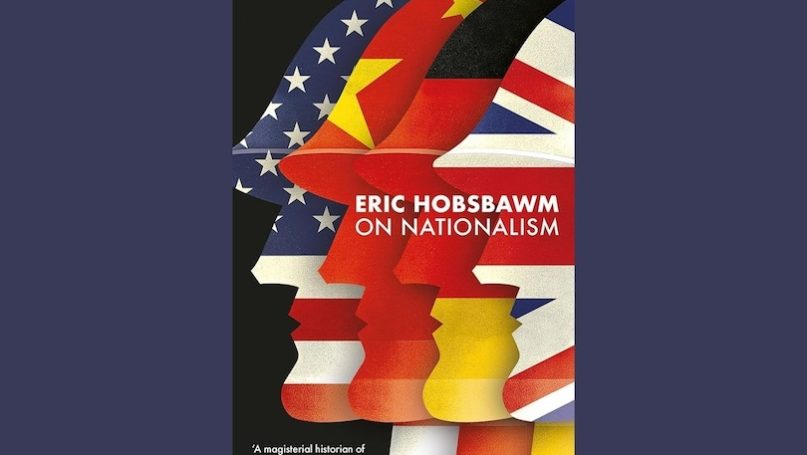
On Nationalism
By Eric Hobsbawm
Edited and Introduced by Donald Sassoon
Little, Brown Book Group, 2021
Understanding nationalism was to Eric Hobsbawm the puzzle of a lifetime. Born Jewish in Egypt in 1917, he was half-British and half-Austrian. Nationalist hostility towards expatriates saw the family leave for Vienna, the epicentre of an Austro-Hungarian Empire that had just been defeated in World War I. Reminders of its diversity were constant; he was fluent in German, childminded by a Slovenian, and in one apartment building supervised by Czechs. In 1931, his mother’s death forced him to move to relatives in Berlin. Here, he witnessed the emergence of Nazi Germany in and before 1933 and became interested in history by reading Karl Marx.
Such “rootless cosmopolitanism”, editor Donald Sassoon suggests in the introduction to this posthumous volume, led Hobsbawm to the anti-nationalism most evidenced in his Nations and Nationalism since 1780 (1990). On Nationalism can be viewed as a complementary anthology to this work. Just as the tumult of Hobsbawm’s upbringing foreshadowed his original book, so Sassoon justifies this new collection by warning “that we stand on the doorstep of an age when the internet and the globalization of capital threaten to blow away many national boundaries while, partly as a reaction, nationalism seems to re-emerge with renewed strength” (p.viii).
On Nationalism comprises two sections. The first, “Nationalism in History”, elaborates Hobsbawm’s belief that nationalism is a modern, European construct. Central to this elaboration are three chapters, one each from The Age of trilogy on the “long nineteenth-century” (1789–1914), which together frame how nationalism evolved throughout this period.
Hobsbawm argues that the universalism of the French Revolution split into national movements during the 1830s, weakening revolutionary prospects in Europe by founding themselves on bourgeois interests. This combination of nationalism and capitalism (symbolic of the “double revolution”, French and Industrial) culminated in the Revolutions of 1848. Instigated by the same bourgeoisie, these movements lacked proletarian leadership and strong class consciousness. What followed were many separate revolts across the continent, where otherwise a single and popular transformation might have taken place. The decades before and including World War I shifted national identification away from the bourgeoisie and towards the masses, familiarly manifesting itself in linguistic, ethnic, and cultural solidarities.
Since Hobsbawm viewed nationalism as irrational and deceptive, several chapters explore its conceptual problems. Among them are his two excerpts from The Invention of Tradition (1983), which demonstrate how the ritualism behind modern practices can render some to appear superficially old, creating cohesion within otherwise artificial communities. Two further pieces discuss the complex intersection between workers’ loyalty to their nation and to their social class, with Hobsbawm celebrating proletarian links with internationalism.
The book’s second section, “The Perils of Nationalism”, draws heavily on reviews by the historian. In it, Hobsbawm provides a more personal and argumentative account of his historical analysis within the context of global developments after World War II.
In a decolonising system of sovereign equality, nation-states went on declaring independence with claims of primordialism. Widespread belief in these falsities was contradictory in a world that was rapidly globalising, reshaped by the rise of intergovernmentalism. Even still, linguistic intolerance persisted, identities beyond the ethnic were too often irrelevant, and the nation as a political unit remained invincible. Most dangerous was the fact that, for many nations, only absolute self-determination would suffice. British nationalism during the Falklands War is presented as the illustrative case.
This latter section also contains two chapters on the spread and influence of Jews since the eighteenth-century. On Nationalism’s categorisation of these pieces as representing “The Perils of Nationalism” lacks a nuance that Hobsbawm himself displays. For example, he observes a tragic “paradox” whereby, after the Holocaust, the historically accomplished Jewish diaspora clustered in Israel at the same time as “the virtual disappearance of the anti-Semitism and discrimination of my youth” (p.308). While Hobsbawm doubtless sees Nazism and Zionism as nationalist “perils”, his belief in the ethnic ingenuity of the Jewish people is hard to dispute.
This over-generalisation can be attributed to the book’s scarcity of context and analysis. In re-issuing an assortment of Hobsbawm’s writings, Sassoon’s effort is welcome but not ambitious. Beyond its introduction, this volume leaves readers to suppose common threads for themselves. That Hobsbawm largely holds nationalism as modern, false, and corrupt is a simple conclusion but the truest one. Instead, the time has come to study the historian using a wider thematic scope, beginning with elements of his own scholarship. Does Hobsbawm’s view of African American culture in The Jazz Scene (1959) agree with his other works on race and ethnicity? How might these factors have impacted the peasants in Bandits (1969)? As a minimum, On Nationalism showcases crucial material from which more innovative studies can be achieved.